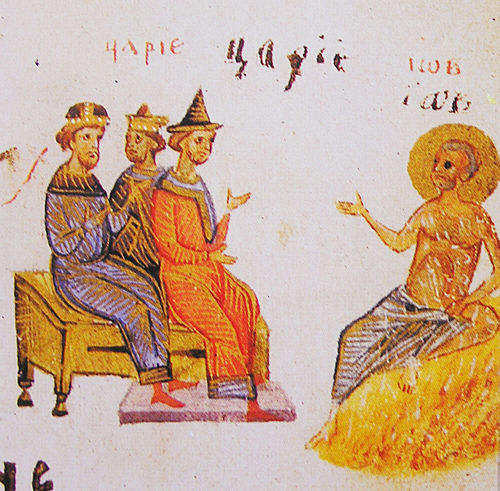In Job 2:11:
Now when Job's three friends heard of all this evil that was come upon him, they came every one from his own place; Eliphaz the Temanite, and Bildad the Shuhite, and Zophar the Naamathite: for they had made an appointment together to come to mourn with him and to comfort him.
From wikipedia:
Eliphaz appears mild and modest; in his first reply to Job's complaints, he argues that those who are truly good are never entirely forsaken by Providence, but that punishment may justly be inflicted for secret sins. He denies that any man is innocent and censures Job for asserting his freedom from guilt. Eliphaz exhorts Job to confess any concealed iniquities to alleviate his punishment. His arguments are well supported but God declares at the end of the book that Eliphaz believed an erroneous view of divine dispensations.Job offers a sacrifice to God for Eliphaz's error.
Bildad the Shuhite, was one of Job's three friends who visited the patriarch in the Hebrew Bible's Book of Job. He was a descendant of Shuah, son of Abraham and Keturah (Genesis 25:1 - 25:2), whose family lived in the deserts of Arabia, or a resident of the district.[1] In speaking with Job, his intent was consolation, but he became an accuser, asking Job what he has done to deserve God's wrath.
Zophar
In the Hebrew Bible/Old Testament Book of Job, Zophar the Naamathite is one of the three friends of Job who visits to comfort him during his illness. His comments can be found in Job chapter 11 and 20. He suggests that Job's suffering could be divine punishment, and goes into great detail about the consequences of living a life of sin.
Unlike friends Bildad and Eliphaz, Zophar only speaks twice to Job. He is the most impetuous and dogmatic of the three. Zophar is the first to accuse Job directly of wickedness; averring indeed that his punishment is too good for him (Job 11:6);
(The ideas of good and evil are central in the Bible and in Blake's thought; he approached it with his early illuminated poem,The Marriage of Heaven and Hell , but 25 or so years later he used good and Evil more conventionally.)
In the Hebrew Bible/Old Testament Book of Job, Zophar the Naamathite is one of the three friends of Job who visits to comfort him during his illness. His comments can be found in Job chapter 11 and 20. He suggests that Job's suffering could be divine punishment, and goes into great detail about the consequences of living a life of sin.
Unlike friends Bildad and Eliphaz, Zophar only speaks twice to Job. He is the most impetuous and dogmatic of the three. Zophar is the first to accuse Job directly of wickedness; averring indeed that his punishment is too good for him (Job 11:6);
What! shall we recieve Good at the hand of God & shall we not also recieve Evil
Job 2;12
Now when Job's three friends heard of all this evil that was come upon him, they came every one from his own place; Eliphaz the Temanite, and Bildad the Shuhite, and Zophar the Naamathite: for they had made an appointment together to come to mourn with him and to comfort him.
12And when they lifted up their eyes afar off, and knew him not, they lifted up their voice, and wept; and they rent every one his mantle, and sprinkled dust upon their heads toward heaven.
13So they sat down with him upon the ground seven days and seven nights, and none spake a word unto him: for they saw that his grief was very great.
12And when they lifted up their eyes afar off, and knew him not, they lifted up their voice, and wept; and they rent every one his mantle, and sprinkled dust upon their heads toward heaven.
13So they sat down with him upon the ground seven days and seven nights, and none spake a word unto him: for they saw that his grief was very great.
What? shall we receive good at the hand of God, and shall we not receive evil? (Job 2:10)
And when they lifted up their eyes afar off, and knew him not, they lifted up their voice, and wept; and they rent every one his mantle, and sprinkled dust upon their heads towards heaven (Job 2:12)
Ye have heard of the Patience of Job and have seen the end of the Lord.
 |
| from the Kiev Psalter of 1397. Job and Friends |




